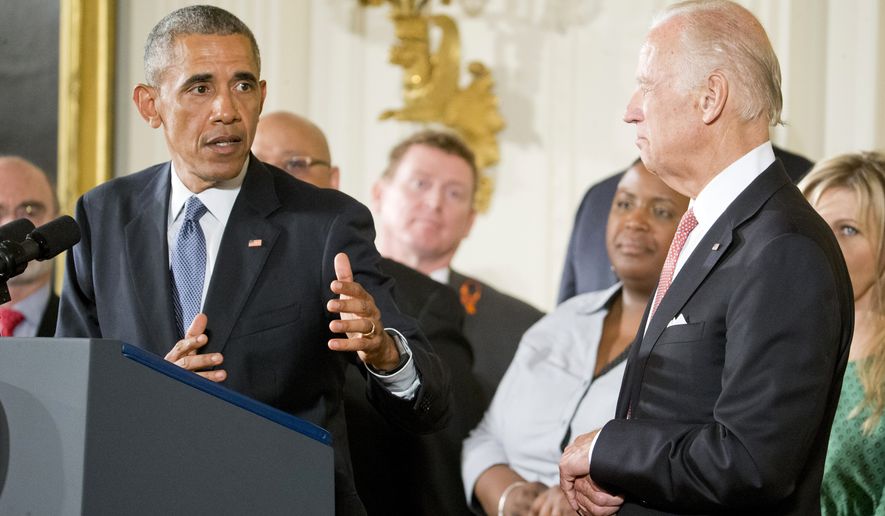Former law enforcement agents say none of President Obama’s new gun regulations addresses the difficulty investigators face in securing convictions against unlicensed gun dealers.
Former ATF agents say the regulations, which will require collectors and hobbyists who sell firearms to obtain federal licenses, remain too vague to help investigators, who already face a tough time prosecuting individuals who sell a small number of guns.
“The typical unlicensed dealer is a middle-aged or older white male with no criminal record, and taking those kinds of people before a jury, you’ve got to bend over backwards to show that you gave them an out,” said William J. Vizzard, a former Bureau of Alcohol, Tobacco, Firearms and Explosives agent and retired criminal justice professor.
The ATF plans to crack down on gun dealers who are not registered as federal firearms licensees, and as a result do not run background checks on buyers, by clarifying who they think is “engaged in the business” of selling firearms and thus required to obtain a federal license.
To charge someone with illegally selling firearms without a license, investigators have to be able to prove that the person is selling firearms for profit as a principal livelihood.
“In order to make that case, you have to make repeated undercover buys from a person at a gun show to show that they are doing it repeatedly, that they have new stock,” said Daniel O’Kelly, director of the International Firearm Specialist Academy and a retired ATF agent, explaining what goes into such investigations.
But an investigation that spans months and requires repeated gun buys from a dealer can be stopped in its tracks if prosecutors don’t think they can convince a jury, said Mr. O’Kelly, adding that he once had a case of his own spiked because it had “no sex appeal.”
“It was not uncommon to take a provable gun case to a federal prosecutor and to be told that it had no jury appeal,” Mr. O’Kelly said. “In the prosecutor’s defense, this is a very patriotic country and the people you end up with on these juries are very sympathetic to these guys who may be veterans and could now go to prison because they sold three guns.”
Cases that do get prosecuted are the egregious violations, Mr. Vizzard said.
Such recent examples include charges brought against Salem, Oregon, business owner Andrew Phillip Nordstrom, who pleaded guilty to engaging in a firearms business without a license in October after a yearlong ATF investigation.
According to a sentencing memo filed in federal court, Nordstrom had purchased dozens of firearms from a federally licensed firearms store but turned around and sold the guns he bought online without conducting any background checks. One of the buys that ATF agents made from Nordstrom, according to court documents, was to a convicted felon working as an undercover informant. That felon was able to purchase a 9 mm handgun.
Nearly 300 firearms were seized from Nordstrom’s store and home during an ATF raid.
A spokesman for the Justice Department noted that as part of the Obama administration’s efforts, the ATF will budget to add an additional 200 agents and has established an Internet Investigations Center that focuses on tracking illegal online gun sales.
In response to questions regarding the criticism from former agents, DOJ spokesman Patrick Rodenbush said the department “focuses its investigative and prosecutive resources on enforcement that will have the greatest impact on violent crime in our communities.”
A fact sheet distributed by the White House on Mr. Obama’s executive actions notes that the ATF will not require a certain number of firearms to be sold in order to consider someone “engaged in the business” of selling guns.”
“There is no specific threshold number of firearms purchased or sold that triggers the licensure requirement. But it is important to note that even a few transactions, when combined with other evidence, can be sufficient to establish that a person is ’engaged in the business,’” the fact sheet states.
In a statement issued Tuesday by the National Shooting Sports Foundation, the group critiqued the rule as too vague.
“The criteria for what will constitute being ’engaged in the business’ going forward needs considerable clarification and raises questions about enforceability,” the group said in a statement.
Mr. Vizzard said requiring a specific number of firearms to be sold in order to require a federal license would make the system understandable to ordinary gun owners and provide law enforcement with clear direction.
“That’s the simple, fair way,” he said.
• Andrea Noble can be reached at anoble@washingtontimes.com.




Please read our comment policy before commenting.